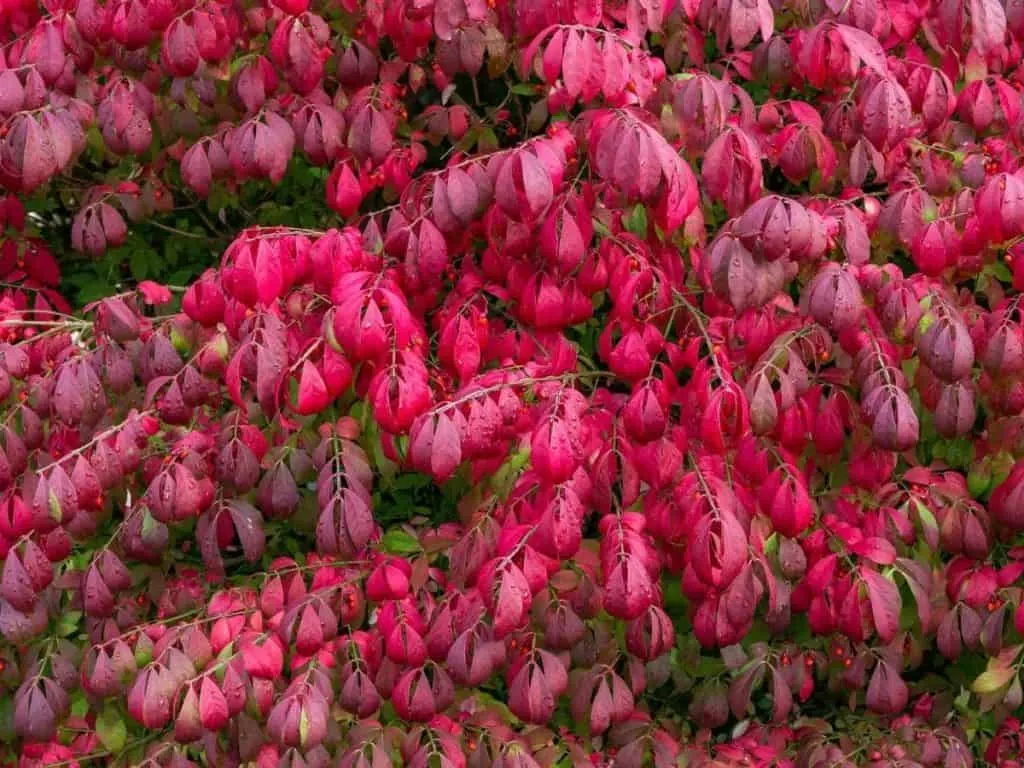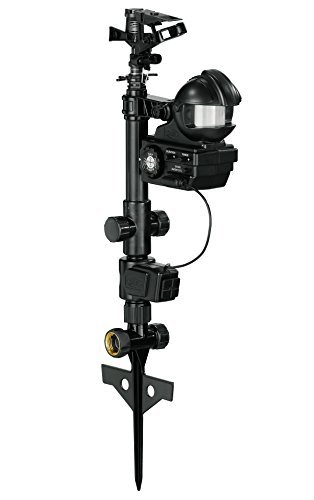Burning bush, also known as winged spindle and winged euonymus, is a flowering plant native to China, Japan, and Korea. It is a popular ornamental tree, and because of its attractive bright-colored fruits and blooms during the fall, it can be seen in most gardens and parks.
Also, as this tree is often found in the wild, many wild animals enjoy eating its leaves and fruits.
Do deer eat burning bush?
Deer seldom eat burning bush. When they have access to other food items, they will not eat burning bush. During the harsh winter season, when food is scarce, they will almost eat about anything that they can find available. That is when they might eat burning bush.
Table of Contents

Deer do not prefer eating ornamental trees like burning bush. During the warm and spring seasons, there are lots of food sources available to them. At those times, they can be hardly seen eating leaves or fruits of the burning bush or any other ornamental trees.
When winter arrives, the number of food items available to deer decreases. As a result, they end up hungry and look for any food that they can consume, and at that time, they will eat virtually any plant matter that they can find.
So, they end up popular eating ornamental trees like burning bush.
Below are some types of burning bush with brief explanations:
Burning bush plants:
Burning bush plants are commonly found in North America because of their landscapes. These plants are native to Asia and are the favorite of many wild animals. However, deer do not prefer eating burning bush plants.
Deer do not eat burning bushes because they do not like the taste of its leaves and fruits.
Burning bush shrubs or hedge:
Part of the burning bush family, the burning bush shrubs grow at a moderate pace. They grow at about 1-2 feet per year till they are matured. Few wild animals eat the leaves of these shrubs.
However, deer do not eat burning shrubs or hedges because of the taste of the leaves.
Dwarf burning bush:
Dwarf burning bushes have a sensational accent because of their scarlet red leaves in the fall. During summer and spring, it displays rich green leaves. Deer do not eat burning bushes in the summer and spring seasons. However, in winter, deer will eat and damage the plant.
Euonymus burning bush:
Also called euonymus alatus, the euonymus burning bush can be seen in most parks and gardens because of the beautiful red leaves it has during the fall season. The attractive deciduous tree is a favorite for some wild animals excluding deer.
Deer do not like the leaves’ taste and hence, avoid eating it.
Winged burning bush:
A winged burning bush, also known as winged euonymus, is an ornamental plant that is used mainly for landscaping purposes. Even though it is invasive, it is still famous for its intense red foliage and winged stems.
It can be seen in parks, beside roads and industrial areas. In the winter, deer prefer eating the small fruits for sustenance that these trees produce with the leaves.
Little Moses burning bush:
Little Moses burning bush is the miniature version of the burning bush trees. These plants show dark green leaves throughout the spring and summer, and the leaves turn scarlet red. It gets densely covered with red leaves and makes any garden look beautiful.
Deer seldom eat Little Moses burning bush as these make leaves almost throughout the whole year.
The burning bush plants that deer eat are untouched during the other seasons except for winter. In winter, these plants are rarely eaten by deer searching for food.
Are burning bushes deer resistant?
Burning bushes are deer resistant. Deer are not fond of the taste of the leaves of a burning bush. Therefore, they tend to avoid eating the leaves and fruits of this plant.
Burning bush displays spectacular red-colored leaves during the fall season, and during the spring and summer, it makes rich green leaves. Throughout the whole year, burning bushes make leaves. This rugged plant can grow in unsuitable soils and can also tolerate drought.
Burning bushes are deciduous trees so, make leaves during the winter too. As a result, during the winter, deer eat burning bushes. But since burning bushes are deer resistant, their leaves have a taste disliked by deer.
Therefore, deer do not like eating burning bushes because of the taste of the leaves and fruits. So, they only eat these plants when they can no longer find a better alternative to sustain themselves in the winter.
Do deer like burning bushes?
No, deer do not like burning bushes. As mentioned earlier, burning bushes are deer resistant. They have a particular taste in their leaves that deer are not fond of and avoid.
Deer will only eat burning bushes when they cannot find any other food. Deer eat burning bushes in the winter when food becomes scarce. At that time, deer eat any plant matter available to them.
Deer ate my burning bush. Will it grow back?
When deer and other animals eat and damage plants, they may or may not grow back depending on the species. Some species of plants grow back the way they were, but some species cannot grow back to being the same.
Similarly, if deer eat your burning bushes, there is a chance they will grow back. Most species of burning bushes grow back while few do not. So, depending on the species of burning bush that you have, it may or may not grow back.
How do you stop deer from eating burning bushes?
Deer can be a real issue when it comes to damaging landscape plants. Deer can be deterred from eating burning bushes by using the following tips:
Deer-resistant plants:
Planting deer-resistant plants around burning bushes will ensure that deer do not try going near burning bushes. Having deer-resistant plants near your burning bushes will steer away any deer searching for food.
Fencing:
Proper fencing around your burning bushes will stop deer from getting close to the plants. The fence should be high enough so that the deer cannot go over them and should not have too much space between them. One suggestion is to use tall wired fences. They are tall enough to stop deer from eating and damaging your burning bushes.

Deer repellents:
One of the most effective ways of keeping deer at bay is by using deer repellents on plants that are not deer resistant. Deer repellents consist of fragrances that deer dislike.
Deer repellent makes them stay away from the plants and saves them from getting damaged by deer. With deer repellents, deer will not even come close. However, deer repellents need to be used regularly for maximum effectiveness.

Sprinklers:
Previously, deer used to be scared of loud noises. So, people used to install alarms that would scare deer off the property. But in the case of suburban deer, they are not easily scared with loud noises.
Therefore, an effective alternative is to use motion-activated sprinklers. When motion is detected, the sprinklers activate and spray water. Spraying of water can scare off deer from near the burning bushes.

Other methods will work too. The above tips have been the most effective for most people in keeping deer away from their garden and plants.
What animal is eating my burning bush?
Other than deer, some various other animals and pests eat burning bushes. Below are some of them:
Rabbits:
Rabbits are known to eat plant matter. Rabbits tend to taste the leaves of every plant that it comes across. It takes a bite off the leaves and tastes it. Rabbits enjoy the taste of leaves of burning bushes.
Therefore, they eat a lot of burning bushes leaves and come back later when they are hungry.
Field mice:
Field mice are a significant problem for any plant. These mice eat the stems as well as the leaves. As a result, the plant gets damaged and cannot recover from such damage. Field mice eat the stems that often causes some plants to expire.
So, pest repellents need to be used to keep field mice at bay.
Final Thoughts
Deer only eat ornamental trees when they cannot find better alternatives. As burning bush is deer resistant, deer seldom eat burning bush during the winter season. They do not eat burning bush frequently because they do not like the taste present in the leaves and fruits.
